Students must practice these Maths 2B Important Questions TS Inter Second Year Maths 2B Circles Important Questions Long Answer Type to help strengthen their preparations for exams.
TS Inter Second Year Maths 2B Circles Important Questions Long Answer Type
Question 1.
Find the equation of the circle passing through the points (5, 7), (8, 1), (1, 3). (May ’10)
Solution:
Let the equation of the required circle
x2 + y2 + 2gx + 2fy + c = 0 ……..(1)
Since equation (1) passes through (5, 7), then
(5)2 + (7)2 + 2g(5) + 2f(7) + c = 0
⇒ 25 + 49 + 10g + 14f + c = 0
⇒ 10g + 14f + c = -74 …….(2)
Since equation (1) passes through (8, 1) then
(8)2 + (1)2 + 2g(8) + 2f(1) + c = 0
⇒ 64 + 1 + 16g + 2f + c = 0
⇒ 16g + 2f + c = -65 ……..(3)
Since equation (1) passes through (1, 3)
(1)2 + (3)2 + 2g(1) + 2f(3) + c = 0
⇒ 1 + 9 + 2g + 6f + c = 0
⇒ 2g + 6f + c = -10 ………(4)
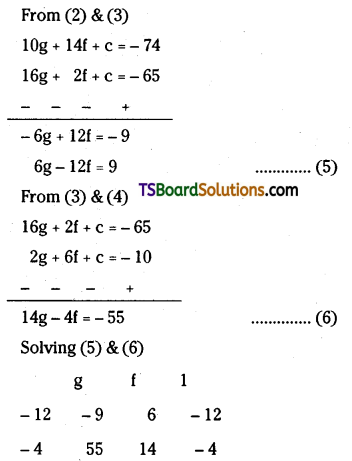
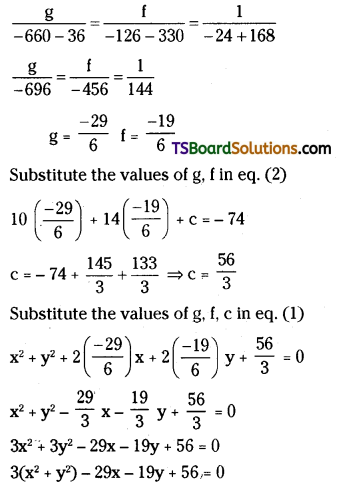
Question 2.
Find the equation of the circle passing through (-2, 3), (2, -1), and (4, 0).
Solution:
Let, the required equation of the circle is
x2 + y2 + 2gx + 2fy + c = 0 ………(1)
Since (1) passes through (-2, 3), then
(-2)2 + (3)2 + 2g(-2) + 2f(3) + c = 0
⇒ 4 + 9 – 4g + 6f + c = 0
⇒ -4g + 6f + c = -13 ……….(2)
Since (1) passes through (2, -1), then
(2)2 + (-1)2 + 2g(2) + 2f(-1) + c = 0
⇒ 4 + 1 + 4g – 2f + c = 0
⇒ 4g – 2f + c = -5 ……..(3)
Since (1) passes through (4, 0) then
(4)2 + (0)2 + 2g(4) + 2f(0) + c = 0
⇒ 16 + 8g + c = 0
⇒ 8g + c = -16 ………(4)
From (2) and (3)
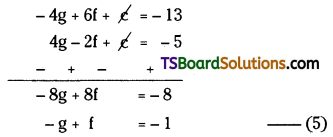
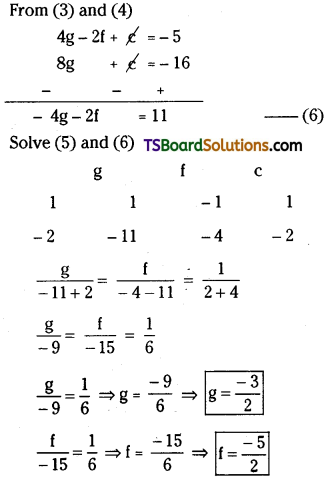
Substitute the value of ‘g’ in (4)
8(\(\frac{-3}{2}\)) + c = -16
⇒ -12 + c = -16
⇒ c = -4
Now substitute the values of g, f, c in (1)
∴ The required equation of the circle is
x2 + y2 + 2(\(\frac{-3}{2}\)) x + 2(\(\frac{-5}{2}\)) y – 4 = 0
⇒ x2 + y2 – 3x – 5y – 4 = 0
![]()
Question 3.
Find the equation of the circle passing through the points (3, 4), (3, 2), (1, 4). [(AP) Mar. ’18, May ’16; (TS) ’16]
Solution:
Let, the equation of the required circle is
x2 + y2 + 2gx + 2fy + c = 0 ………(1)
Since, (1) passes through the point (3, 4), then
(3)2 + (4)2 + 2g(3) + 2f(4) + c = 0
⇒ 9 + 16 + 6g + 8f + c = 0
⇒ 6g + 8f + c = -25 ……..(2)
Since, (1) passes through the point (3, 2)
(3)2 + (2)2 + 2g(3) + 2f(2) + c = 0
⇒ 9 + 4 + 6g + 4f + c = 0
⇒ 6g + 4f + c = -13 ……(3)
Since, (1) passes through the point (1, 4)
(1)2 + (4)2 + 2g + 2f(4) + c = 0
⇒ 1 + 16 +2g + 8f + c = 0
⇒ 2g + 8f + c = -17 ……….(4)
From (2) and (3)
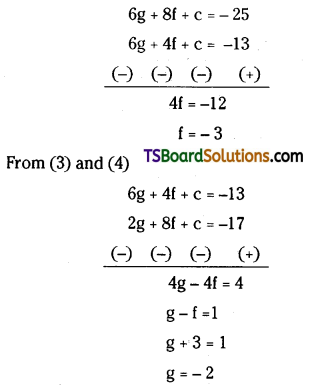
Substitute the value of g, f in (2)
6(-2) + 8(-3) + c = -25
⇒ -12 – 24 + c = – 25
⇒ c = -25 + 36
⇒ c = 11
Substitute the values of g, f, c in (1)
x2 + y2 + 2(-2)x + 2(-3)y + 11 = 0
⇒ x2 + y2 – 4x – 6y + 11 = 0
∴ The equation of the required circle is x2 + y2 – 4x – 6y + 11 = 0.
Question 4.
Find the equation of the circle passing through (2, 1), (5, 5), (-6, 7).
Solution:
Let, the equation of the required circle is
x2 + y2 + 2gx + 2fy + c = 0 …….(1)
Since (1) passes through the point (2, 1), then
(2)2 + (1)2 + 2g(2) + 2f(1) + c = 0
⇒ 4 + 1 + 4g + 2f + c = 0
⇒ 4g + 2f + c = -5 …….(2)
Since (1) passes through point (5, 5), then
(5)2 + (5)2 + 2g(5) + 2f(5) + c = 0
⇒ 25 + 25 + 10g + 10f + c = 0
⇒ 10g + 10f + c = -50 ………(3)
Since (1) passes through the point (-6, 7) then
(-6)2 + (7)2 + 2g(-6) + 2f(7) + c = 0
⇒ 36 + 49 – 12g + 14f + c = 0
⇒ -12g + 14f + c = -85 …….(4)
From (2) and (3)
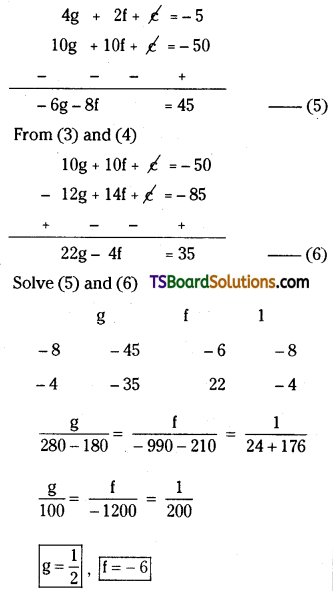
Substitute the value of g, f in (2)
4(\(\frac{1}{2}\)) + 2(-6) + c = -5
2 – 12 + c = -5
⇒ c = -5 + 10
⇒ c = 5
Now, substitute the values of g, f, c in (1)
∴ The required equation of the circle is x2 + y2 + 2(\(\frac{1}{2}\))x + 2(-6)y + 5 = 0
⇒ x2 + y2 + x – 12y + 5 = 0
Question 5.
Show that the points (1, 2), (3, -4), (5, -6), (19, 8) are concyclic and find the equation of the circle on which they lie. [(TS) Mar. ’16, May ’15]
Solution:
Let the equation of the required circle is
x2 + y2 + 2gx + 2fy + c = 0 ……..(1)
Since the eq.(1) passes through the point (1, 2) then
(1)2 + (2)2 + 2g(1) + 2f(2) + c = 0
⇒ 2g + 4f + c = -5 ……….(2)
Since the eq.(1) passes through the point (3, -4) then
(3)2 + (-4)2 + 2g(3) + 2f(-4) + c = 0
⇒ 9 + 16 + 6g – 8f + c = 0
⇒ 6g – 8f + c = -25 …………. (3)
Since the eq.(1) passes through the point (5, -6) then
(5)2 + (-6)2 + 2g(5) + 2f(-6) + c = 0
⇒ 25 + 36 + 10g – 12f + c = 0
⇒ 10g – 12f + c = -61 ………(4)
From (2) & (3)
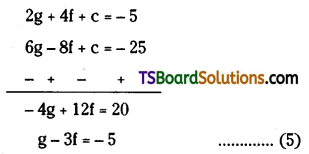
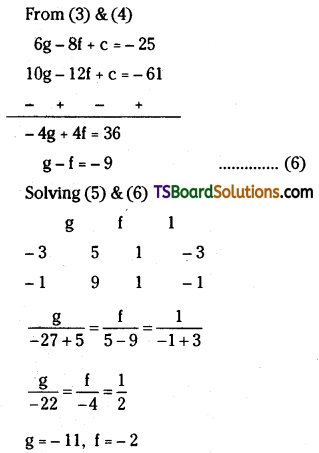
Substitute the values of g, f in eq. (2)
2(-11) + 4(-2) + c = -5
⇒ -22 – 8 + c = -5
⇒ c = 25
Substitute the values of g, f, c in eq. (1)
x2 + y2 + 2(-11)x + 2(-2)y + 25 = 0
⇒ x2 + y2 – 22x – 4y + 25 = 0 ………(7)
Now, substitute the point (19, 8) in eq. (7)
(19)2 + (8)2 – 22(19) – 4(8) + 25 = 0
⇒ 361 + 64 – 418 – 32 + 25 = 0
⇒ 0 = 0
∴ Given points are concyclic.
∴ The equation of the circle is x2 + y2 – 22x – 4y + 25 = 0.
![]()
Question 6.
Show that the points (9, 1), (7, 9) (-2, 12), (6, 10) are concyclic and find the equation of the circle on which they lie. [(TS) Mar. ’19]
Solution:
Let, the equation of the required circle is x2 + y2 + 2gx + 2fy + c = 0 ………(1)
Since (1) passes through point (9, 1), then
(9)2 + (1)2 + 2g(9) + 2f(1) + c = 0
⇒ 81 + 1 + 18g + 2f + c = 0
⇒ 18g + 2f + c = -82 ………(2)
Since (1) passes through the point (7, 9), then
(7)2 + (9)2 + 2g(7) + 2f(9) + c = 0
⇒ 49 + 81 + 14g + 18f + c = 0
⇒ 14g + 18f + c = -130 ……..(3)
Since (1) passes through the point (-2, 12) then
(-2)2 + (12)2 + 2g(-2) + 2f(12) + c = 0
⇒ 4 + 144 – 4g + 24f + c = 0
⇒ -4g + 24f + c = -148 ……..(4)
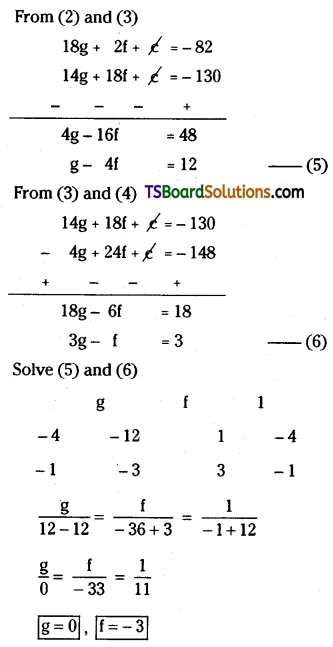
Substitute the value of g, f in (2)
18(0) + 2(-3) + c = -82
⇒ 6 + c = -82
⇒ c = -82 + 6
⇒ c = -76
Substitute the values of g, f, c in (1)
∴ The equation of the required circle is x2 + y2 + 2(0)x + 2(-3)y – 76 = 0
⇒ x2 + y2 – 6y – 76 = 0 ………(7)
Substitute the point (6, 10) in (7)
(6)2 + (10)2 – 6(10) – 76 = 0
⇒ 36 + 100 – 60 – 76 = 0
⇒ 136 – 136 = 0
⇒ 0 = 0
∴ The given points are concyclic.
∴ The equation of the required circle is x2 + y2 – 6y – 76 = 0
Question 7.
If (2, 0), (0, 1), (4, 5), and (0, c) are concyclic then find ‘c’. [(AP) May ’19. ’15, Mar. ’17, ’15) (TS) Mar. ’17, ’15, May ’14]
Solution:
Let the equation of the required circle is
x2 + y2 + 2gx + 2fy + c = 0 ……..(1)
Since eq. (1) passes through the point (2, 0) then
(2)2 + (0)2 + 2g(2) + 2f(0) + c = 0
⇒ 4 + 4g + c = 0
⇒ 4g + c = -4 ……(2)
Since eq. (1) passes through the point (0, 1) then
(0)2 + (1)2 + 2g(0) + 2f(1) + c = 0
⇒ 2f + c = -1 ……..(3)
Since eq. (1) passes through the point (4, 5) then
(4)2 + (5)2 + 2g(4) + 2f(5) + c = 0
⇒ 16 + 25 + 8g + 10f + c = 0
⇒ 8g + 10f + c = -41 ……(4)
From (2) & (3)
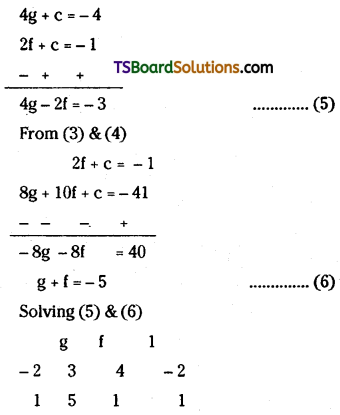
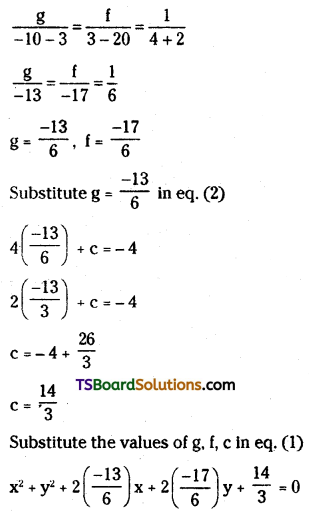
3x2 + 3y2 – 13x – 17y + 14 = 0 ……..(7)
Since the given points are concyclic, then the point (0, c) lies on (7).
3(0)2 + 3(c)2 – 13(0) – 17(c) + 14 = 0
⇒ 3c2 – 17c + 14 = 0
⇒ 3c2 – 14c – 3c + 14 = 0
⇒ 3c(c – 1) – 14(c – 1) = 0
⇒ (c – 1) (3c – 14) = 0
⇒ c = 1, c = \(\frac{14}{3}\)
Question 8.
If (1, 2), (3, -4), (5, -6), and (c, 8) are concyclic, then find ‘c’.
Solution:
Let, the equation of the required circle is
x2 + y2 + 2gx + 2fy + c = 0 …….(1)
Since (1) passes through the point (1, 2), then
(1)2 + (2)2 + 2g(1) + 2f(2) + c = 0
⇒ 1 + 4 + 2g + 4f + c = 0
⇒ 2g + 4f + c = -5 …….(2)
Since (1) passes through point (3, -4), then
(3)2 + (-4)2 + 2g(3) + 2f(-4) + c = 0
⇒ 9 + 16 + 6g – 8f + c = 0
⇒ 6g – 8f + c = -25 …….(3)
Since (1) passes through point (5, -6) then
(5)2 + (-6)2 + 2g(5) + 2f(-6) + c = 0
⇒ 25 + 36 + 10g – 12f + c = 0
⇒ 10g – 12f + c = -61 ……(4)
From (2) and (3)
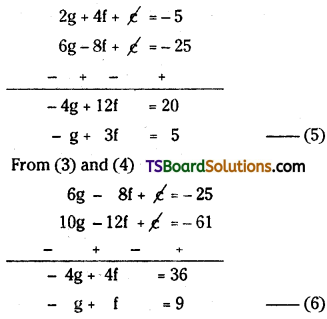
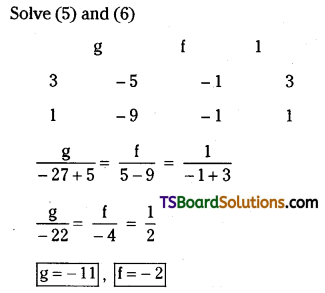
Substitute the value of g, f in (2)
2(-11) + 4(-2) + c = -5
⇒ -22 – 8 + c = -5
⇒ -30 + c = -5
⇒ c = 25
Substitute the values of g, f, c in (1)
The equation of the required circle is x2 + y2 + 2(-11)x + 2(-2)y + 25 = 0
⇒ x2 + y2 – 22x – 4y + 25 = 0 ……..(7)
Substitute point (c, 8) in (7)
(c)2 + (8)2 – 22c – 4(8) + 25 = 0
⇒ c2 + 64 – 22c – 32 + 25 = 0
⇒ c2 – 22c + 57 = 0
⇒ c2 – 19c – 3c + 57 = 0
⇒ c(c – 19) – 3(c – 19) = 0
⇒ (c – 19)(c – 3) = 0
⇒ c = 19, 3
![]()
Question 9.
Find the equation of the circle whose centre lies on the X-axis and passes through (-2, 3) and (4, 5). [Mar. ’15 (AP&TS)]
Solution:
Let the equation of the required circle is
x2 + y2 + 2gx + 2fy + c = 0 …….(1)
Centre of (1) is (-g, -f) lies on the X-axis then -f = 0
⇒ f = 0
Since eq. (1) passes through the point (-2, 3) then
(-2)2 + 32 + 2g(-2) + 2f(3) + c = 0
⇒ 4 + 9 – 4g + 6f + c = 0
⇒ -4g + 6f + c = -13
If f = 0 then
-4g + c = -13 ………(2)
Since eq. (1) passes through the point (4, 5) then
(4)2 + (5)2 + 2g(4) + 2f(5) + c = 0
⇒ 16 + 25 + 8g + 10f + c = 0
⇒ 8g + 10f + c = -41 ………(3)
If f = 0 then 8g + c = -41
Solving (2) & (3)
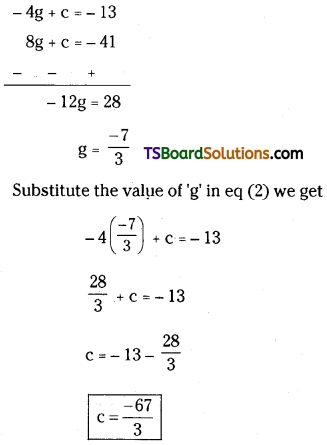
Now, substituting the values of g, f, c in equation (1)
x2 + y2 + 2(\(\frac{-7}{3}\))x + 2(0)y + \(\frac{-67}{3}\) = 0
⇒ 3x2 + 3y2 – 14x – 67 = 0
Question 10.
Find the equation of the circle which passes through (4, 1) (6, 5) and has the centre of 4x + 3y – 24 = 0.
Solution:
Let, the equation of the required circle is
x2 + y2 + 2gx + 2fy + c = 0 ………(1)
Since, (1) passes through point (4, 1) then
(4)2 + (1)2 + 2(4)g + 2f(1) + c = 0
⇒ 16 + 1 + 8g + 2f + c = 0
⇒ 8g + 2f + c = -17 ………(2)
Since, (1) passes through the point (6, 5) then
(6)2 + (5)2 + 2g(6) + 2f(5) + c = 0
⇒ 36 + 25 + 12g + 10f + c = 0
⇒ 12g + 10f + c = – 61 …….(3)
Centre of (1) is C = (-g, -f) lies on the line 4x + 3y – 24 = 0 then
4(-g) + 3(-f) – 24 = 0
⇒ -4g – 3f – 24 = 0
⇒ -4g – 3f = 24 ……..(4)
From (2) and (3)
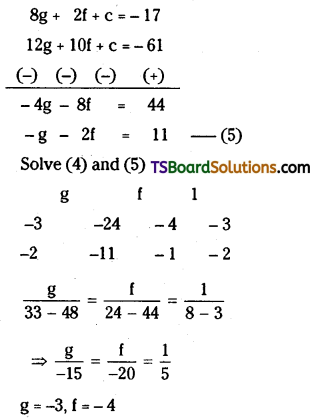
Now, substitute the values of g and f in (2)
8(-3) + 2(-4) + c = -17
⇒ -24 – 8 + c = 17
⇒ c = -17 + 32
⇒ c = 15
Substitute the values of g, f, c in (1)
x2 + y2 + 2(-3)x + 2(-4)y + 15 = 0
⇒ x2 + y2 – 6x – 8y + 15 = 0
Question 11.
Find the equation of a circle which passes through (4, 1) and (6, 5) and has the centre on 4x + 3y – 24 = 0. [(AP) Mar. ’20, ’16. (TS) Mar. ’18; Mar. ’11]
Solution:
Let the equation of the required circle is
x2 + y2 + 2gx + 2fy + c = 0 ………(1)
Since equation (1) passes through point (4, 1) then
(4)2 + (1)2 + 2g(4) + 2f(1) + c = 0
⇒ 16 + 1 + 8g + 2f + c = 0
⇒ 8g + 2f + c = -17 ………..(2)
Since equation (1) passes through the point (6, 5) then
(6)2 + (5)2 + 2g(6) + 2f(5) + c = 0
⇒ 36 + 25 + 12g + 10f + c = 0
⇒ 12g + 10f + c = -61 ……….(3)
Centre of (1) is C = (-g, -f) lies on the line 4x + 3y – 24 = 0 then
4(-g) + 3(-f) – 24 = 0
⇒ -4g – 3f – 24 = 0
⇒ 4g + 3f + 24 = 0 ………(4)
Now (2) – (3)
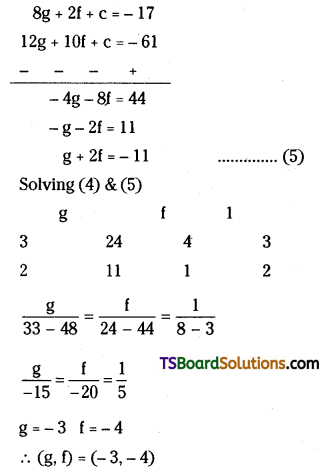
Substitute the values of g, f in eq. (2) we get
8(-3) + 2(-4) + c = -17
⇒ -24 – 8 + c = -17
⇒ c = -17 + 32
⇒ c = 15
Substitute the values of g, f, c in eq. (1)
x2 + y2 + 2(-3)x + 2(-4)y + 15 = 0
⇒ x2 + y2 – 6x – 8y + 15 = 0 which is the required equation of the circle.
![]()
Question 12.
Show that the circles x2 + y2 – 4x – 6y – 12 = 0 and x2 + y2 + 6x + 18y + 26 = 0 touch each other. Also, find the point of contact and common tangent at this point of contact. [(AP) Mar. ’17]
Solution:
Given equations of the circles are
x2 + y2 – 4x – 6y – 12 = 0 ……..(1)
x2 + y2 + 6x + 18y + 26 = 0 ………(2)
For circle (1),
Centre, C1 = (2, 3)
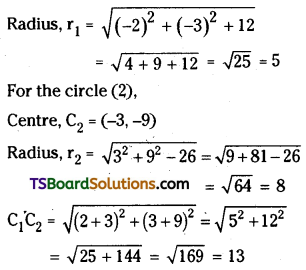
Now, r1 + r2 = 8 + 5 = 13
∴ C1C2 = r1 + r2
∴ The given circles touch each other externally.
Let, P be the point of contact.
Now, the point of contact divides C1C2 in the ratio r1 : r2 = 5 : 8 internally.
∴ Point of contact,
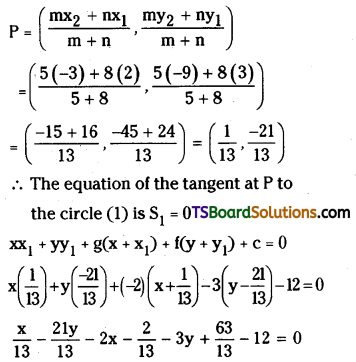
⇒ x – 21y – 26x – 2 – 39y + 63 – 156 = 0
⇒ -25x – 60y – 95 = 0
⇒ 5x + 12y + 19 = 0
Question 13.
Show that x2 + y2 – 6x – 9y + 13 = 0, x2 + y2 – 2x – 16y = 0 touch each other. Find the point of contact and the equation of the common tangent at their point of contact. [(TS) Mar. ’20, ’18; (AP & TS) May ’18]
Solution:
Given equations of the circles are
x2 + y2 – 6x – 9y + 13 = 0 …….(1)
x2 + y2 – 2x – 16y = 0 ………(2)
Centre of (1) is C1 = (3, \(\frac{9}{2}\))
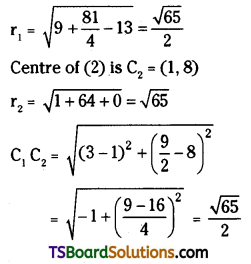
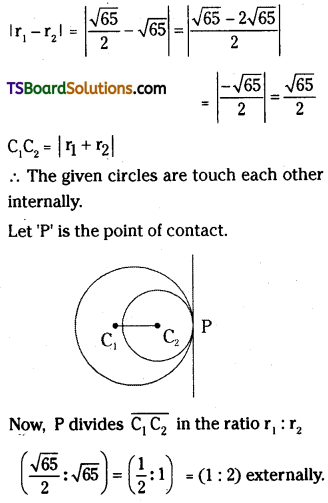
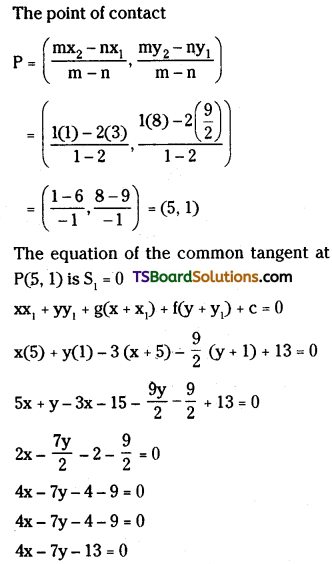
Question 14.
Show that the circles x2 + y2 – 6x – 2y + 1 = 0, x2 + y2 + 2x – 8y + 13 = 0 touch each other. Find the point of contact and the equation of the common tangent at their point of contact. [(AP) May ’19, ’17, ’16; Mar. ’16]
Solution:
Given equations of the circles are
x2 + y2 – 6x – 2y + 1 = 0 ……..(1)
x2 + y2 + 2x – 8y + 13 = 0 ………(2)
Centre of (1) is C1 = (3, 1)
Radius of (1) is r1 = \(\sqrt{9+1-1}\) = 3
Centre of (2) is C2 = (-1, 4)
Radius of (2) is r2 = \(\sqrt{1+16-13}\) = 2
C1C2 = \(\sqrt{(3+1)^2+(1-4)^2}\)
= \(\sqrt{16+9}\)
= 5
r1 + r2 = 3 + 2 = 5
∴ C1C2 = r1 + r2
∴ The given circles touch each other externally.
Let ‘P’ is the point of contact.
Now, ‘P’ divides \(\overline{\mathrm{C}_1 \mathrm{C}_2}\) in the ratio r1 : r2 (3 : 2) internally.
∴ Point of contact
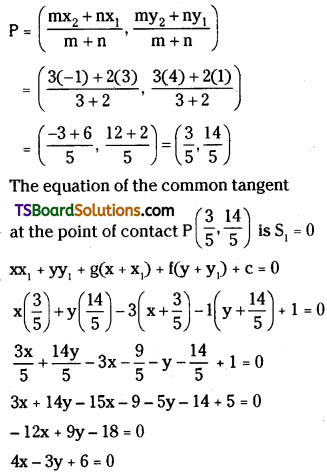
Question 15.
Show that the circles x2 + y2 – 4x – 6y – 12 = 0 and 5(x2 + y2) – 8x – 14y – 32 = 0 touch each other and find their point of contact. [(TS) May ’17]
Solution:
Given equations of the circles are
x2 + y2 – 4x – 6y – 12 = 0 ……….(1)
5(x2 + y2) – 8x – 14y – 32 = 0
⇒ \(x^2+y^2-\frac{8}{5} x-\frac{14}{5} y-\frac{32}{5}=0\) ………(2)
For circle (1),
Centre, C1 = (2, 3)
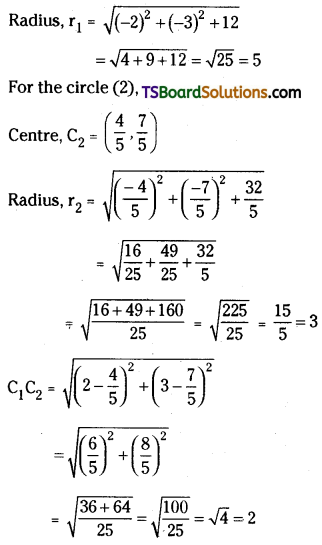
Now, |r1 – r2| = |5 – 3| = 2
∴ C1C2 = |r1 – r2|
∴ The given circles touch each other internally.
Let, ‘P’ be the point of contact.
Now, P divides C1C2 in the ratio r1 : r2 (5 : 3) externally.
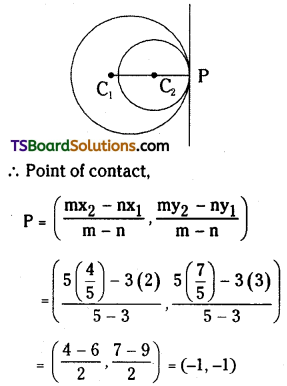
Question 16.
Find the transverse common tangents of the circles x2 + y2 – 4x – 10y + 28 = 0 and x2 + y2 + 4x – 6y + 4 = 0. [(TS) May ’19, Mar. ’17; (AP) Mar. ’19, ’15, ’14]
Solution:
Given equations of the circles are
x2 + y2 – 4x – 10y + 28 = 0 ……..(1)
x2 + y2 + 4x – 6y + 4 = 0 ………(2)
Centre of (1) = (2, 5)
Centre of (2) = (-2, 3)
r1 = \(\sqrt{4+25-28}\) = 1
r2 = \(\sqrt{4+9-4}\) = 3
Distance between \(\overline{\mathrm{C}_1 \mathrm{C}_2}\) = √20
r1 + r2 = 4 = √16
C1C2 > r1 + r2
Given circles completely lie outside each other.
Let A be the internal centre of similitude.
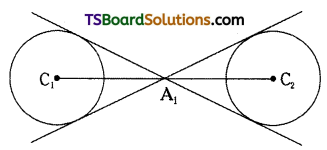
Now, A1 divides \(\overline{\mathrm{C}_1 \mathrm{C}_2}\) in the ratio r1 : r2 (1 : 3) internally.
∴ Internal centre of similitude
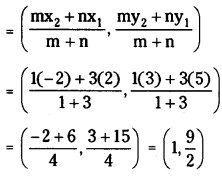
∴ The equation of the pair of transverse common tangents is S . S11 = \(S_1{ }^2\)
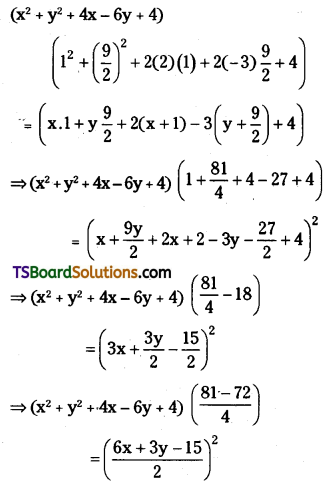
⇒ (x2 + y2 + 4x – 6y + 4) (9) = 9(2x + y – 5)2
⇒ x2 + y2 + 4x – 6y + 4 = 4x2 + y2 + 25 + 4xy – 10y – 20x
⇒ 3x2 + 4xy – 24x – 4y + 21 = 0
Now, 3x2 + 4xy = 0
⇒ x(3x + 4y) = 0
⇒ x = 0, 3x + 4y = 0
3x2 + 4xy – 24x – 4y + 21 = (x + l) (3x + 4y + k)
Comparing ‘x’ coefficients on both sides
k + 3l = -24 ……….(1)
4l = -4 ………(2)
⇒ l = -1
Substitute l = -1 in eq. (1)
k – 3 = – 24
⇒ k = -24 + 3
⇒ k = -21
∴ The transerve common tangents are x – 1 = 0, 3x + 4y – 21 = 0
![]()
Question 17.
Find the direct common tangents of the circles x2 + y2 + 22x – 4y – 100 = 0 and x2 + y2 – 22x + 4y + 100 = 0. [Mar. ’18 (AP); May&Mar. ’15 (TS)]
Solution:
Given the equation of the circles are
x2 + y2 + 22x – 4y – 100 = 0 ……..(1)
x2 + y2 – 22x + 4y + 100 = 0 ……….(2)
Centre of (1) is C1 = (-11, 2)
r1 = \(\sqrt{121+4+100}\) = 15
C2 = (11, -2)
r2 = \(\sqrt{121+4-100}\) = 5
C1C2 = \(\sqrt{(-11-11)^2+(2+2)^2}\)
= \(\sqrt{(-22)^2+(4)^2}\)
= √500
r1 + r2 = 20
C1C2 > r1 + r2
∴ The given circles completely lie outside the circle.
Let A2 be the external centre of similitude.
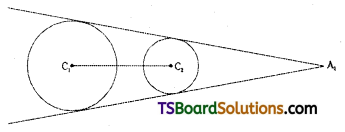
Now, A2 divides \(\overline{\mathrm{C}_1 \mathrm{C}_2}\) in the ratio r1 : r2 (3 : 1) externally.
External of similitude
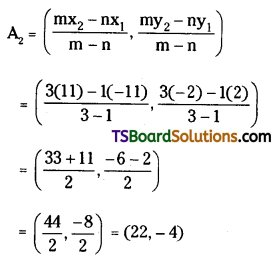
The equation to the pair of direct common tangents is S . S11 = \(\mathrm{S}_1{ }^2\)
⇒ (x2 + y2 + 22x – 4y – 100) ((22)2 + (-4)2 + 2(11) (22) + 2(-2) (-4) – 100) = ((22)x + y(-4) + 2(11) (22) + 11(x) – 2(y) + 1(-2) (-4) – 100)2
⇒ (x2 + y2 + 22x – 4y – 100) (484 + 16 + 484 + 16 – 100) = (22x – 4y + 242 + 11x – 2y + 8 – 100)2
⇒ (x2 + y2 + 22x – 4y – 100) (900) = (33x – 6y + 150)2
⇒ 100(x2 + y2 + 22x – 4y – 100) = (11x – 2y + 50)2
⇒ 100x2 + 100y2 + 2200x – 400y – 10000 = 121x2 + 4y2 + 2500 – 44xy – 200xy + 1100x
⇒ 21x2 – 96y2 – 44xy – 1100x + 200y + 12500 = 0
Now, 21x2 – 44xy – 96y2 = 0
⇒ 21x2 – 72xy + 28xy – 96y2 = 0
⇒ 3x(7x – 24y) + 4y(7x – 24y) = 0
⇒ (7x – 24y) (3x + 4y) = 0
⇒ 7x – 24y = 0, 3x + 4y = 0
∴ 21x2 – 44xy – 96y2 – 1100x + 200y + 12500 = (7x – 24y + l) (3x + 4y + k)
Comparing ‘x’ coeff. on both sides
7k + 3l = -1100 …….(1)
Comparing ‘y’ coeff. on both sides
-24k + 4l = 200 ………(2)
Solve (1) & (2)
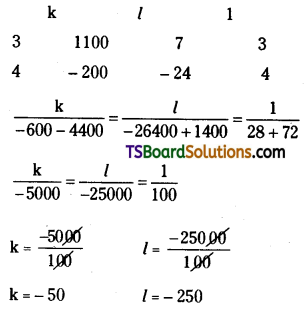
∴ The direct common tangent are 7x – 24y – 250 = 0, 3x + 4y – 50 = 0
Question 18.
Find all common tangents to the circles x2 + y2 + 4x + 2y – 4 = 0 and x2 + y2 – 4x – 2y + 4 = 0.
Solution:
Given equations of the circles are
x2 + y2 + 4x + 2y – 4 = 0 ………(1)
x2 + y2 – 4x – 2y + 4 = 0 ……….(2)
for the circle (1)
Centre C1 = (-2, -1)
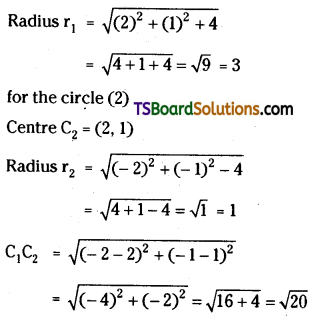
Now, r1 + r2 = 3 + 1 = 4 = √16
∴ C1C2 > r1 + r2
∴ In the two given circles, each circle lies completely outside the other.
To find the external centre of similitude (A2):
Let A2 be the external centre of similitude.
The external centre of similitude, A2 divides C1C2 in the ratio r1 : r2 (3 : 1) externally.
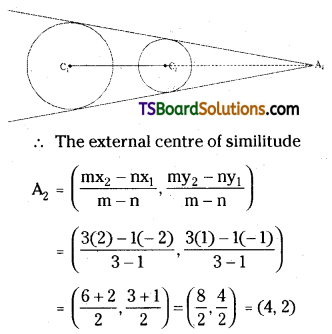
The equation of pair of direct common tangent is SS11 = \(\mathrm{S}_1{ }^2\)
⇒ (x2 + y2 + 2gx + 2fy + c) \(\left(\mathrm{x}_1^2+\mathrm{y}_1^2+2 \mathrm{g} \mathrm{x}_1+2 \mathrm{fy}_1+\mathrm{c}\right)\) = (xx1 + yy1 + g(x + x1) + f(y + y1) + c)2
⇒ (x2 + y2 + 4x + 2y – 4) [(4)2 + (2)2 + 2(2)(4) + 2(1)(2) – 4] = [x(4) + y(2) + 2(x + 4) + 1(y + 2) – 4]2
⇒ (x2 + y2 + 4x + 2y – 4) (16 + 4 + 16 + 4 – 4) = (4x + 2y + 2x + 8 + y + 2 – 4)2
⇒ (x2 + y2 + 4x + 2y – 4) (36) = (6x + 3y + 6)2
⇒ (x2 +y2 + 4x + 2y – 4) (36) = 9(2x + 4 + 2)2
⇒ (x2 + y2 + 4x + 2y – 4) (4) = (2x + y + 2)2
⇒ (x2 + y2 + 4x + 2y – 4) (4) = 4x2 + y2 + 4 + 4xy + 4y + 8x
⇒ 4x2 + 4y2 + 16x + 8y – 16 = 4x2 + y2 + 4xy + 4y + 8x + 4
⇒ 4xy – 3y2 – 8x – 4y + 20 = 0
Consider 4xy – 3y2 = 0
⇒ y(4x – 3y) = 0
⇒ y = 0 (or) 4x – 3y = 0
∴ 4xy – 3y2 – 8x – 4y + 20 = (y + l)(4x – 3y + k)
Comparing the coefficient of x on both sides
4l = -8
⇒ l = -2
Comparing the coefficient of y on both sides.
-3l + k = – 4
⇒ -3(-2) + k = -4
⇒ 6 + k = -4
⇒ k = -10
∴ The equations to the direct common tangents are y – 2 = 0, 4x – 3y – 10 = 0
To find the internal centre of similitude (A1):
Let A1 be the internal centre of similitude.
The internal centre of similitude, A1 divides C1C2 in the ratio r1 : r2 (3 : 1) internally.
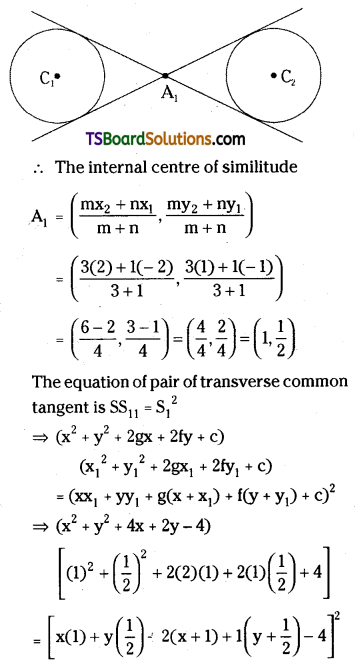
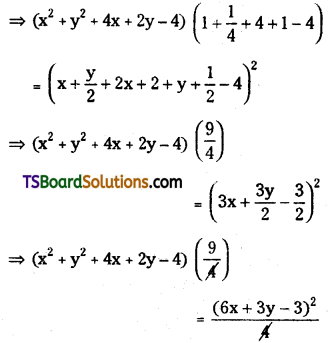
⇒ (x2 + y2 + 4x + 2y – 4) (9) = (9) (2x + y – 1)2
⇒ x2 + y2 + 4x + 2y – 4 = 4x2 + y2 + 1 + 4xy – 2y – 4x
⇒ 3x2 + 4xy – 8x – 4y + 5 = 0
Consider 3x2 + 4xy = 0
⇒ x(3x + 4y) = 0
⇒ x = 0 (or) 3x + 4y = 0
∴ 3×2 + 4xy – 8x – 4y + 5 = (x + l) (3x + 4y + k)
Comparing the coefficient of x on. both sides
3l + k = -8 ………(3)
Comparing the coefficient of y on both sides.
4l = -4 ⇒ l = -1
(3) ⇒ 3(-1) + k = -8
⇒ -3 + k = -8
⇒ k = -5
∴ The equations of the transverse common tangents are x – 1 = 0, 3x + 4y – 5 = 0
∴ The common tangents are x – 1 = 0, 3x + 4y – 5 = 0, y – 2 = 0, 4x – 3y – 10 = 0
![]()
Question 19.
Find the equations of circles that touch 2x – 3y + 1 = 0 at (1, 1) and have a radius √13.
Solution:
Let, the equation of the required circle is x2 + y2 + 2gx + 2fy + c = 0
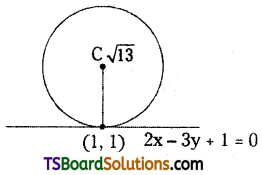
The equation of the tangent at P(1, 1) to the given circle is S1 = 0
xx1 + yy1 + g(x + x1) + f(y + y1) + c = 0
⇒ x(1) + y(1) + g(x + 1) + f(y + 1) + c = 0
⇒ x + y + gx + g + fy + f + c = 0
⇒ x(1 + g) + (1 + f)y + g + f + c = o ………(1)
Given the equation of the tangent is
2x – 3y + 1 = 0 ……….(2)
Now, (1) and (2) represent the same line we get
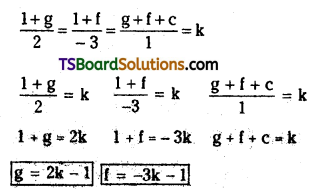
2k – 1 – 3k – 1 + c = k
⇒ -k – 2 + c = k
⇒ c = 2k + 2
Given that, radius, r = √13
\(\sqrt{\mathrm{g}^2+\mathrm{f}^2-\mathrm{c}}=\sqrt{13}\)
Squaring on both sides
g2 + f2 – c = 13
⇒ (2k – 1)2 + (-3k – 1)2 – (2k + 2) = 13
⇒ 4k2 + 1 – 4k + 9k2 + 1 + 6k – 2k – 2 = 13
⇒ 13k2 = 13
⇒ k2 = 1
⇒ k = ±1
Case 1: If k = 1 then
g = 2(1) – 1 = 2 – 1 = 1
f = -3(1) – 1 = -3 – 1 = -4
c = 2(1) + 2 = 2 + 2 = 4
∴ The equation of the required circle is x2 + y2 + 2(1)x + 2(-4)y + 4 = 0
⇒ x2 + y2 + 2x – 8y + 4 = 0
Case 2: If k = -1 then
g = 2(-1) – 1 = -2 – 1 = -3
f = -3(-1) – 1 = 3 – 1 = 2
c = 2(-1) + 2 = -2 + 2 = 0
∴ The equation of the required circle is x2 + y2 + 2(-3)x + 2(2)y + 0 = 0
⇒ x2 + y2 – 6x + 4y = 0
∴ The required circles are x2 + y2 + 2x – 8y + 4 = 0, x2 + y2 – 6x + 4y = 0
Question 20.
If ABCD is a square, then show that the points A, B, C, and D are concyclic.
Solution:
ABCD is a square
Let AB = a, then AD = a
∴ A = (0, 0), B = (a, 0), C = (a, a), D = (0, a)
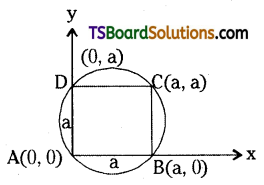
Let the equation of the required circle is
x2 + y2 + 2gx + 2fy + c = 0 …….(1)
Since, (1) passes through point A(0, 0)
(0)2 + (0)2 + 2g(0) + 2f(0) + c = 0
⇒ c = 0
Since (1) passes through point B(a, 0)
(a)2 + (0)2 + 2g(a) + 2f(0) + c = 0
⇒ a2 + 2ga + c = 0
⇒ a2 + 2ga = 0
⇒ a + 2g = 0
⇒ g = \(\frac{-a}{2}\)
Since, (1) passes through the point D(0, a)
(0)2 + a2 + 2g(0) + 2f(a) + c = 0
⇒ 0 + a2 + 2af = 0
⇒ a + 2f = 0
⇒ f = \(\frac{-a}{2}\)
Now, substitute the values of g, f, c in (1), and we get
x2 + y2 + 2(\(\frac{-a}{2}\))x + 2(\(\frac{-a}{2}\))y + 0 = 0
x2 + y2 – ax – ay = 0 ……(2)
Now, substitute the point c(a, a) in (2)
(a)2 + (a)2 – a(a) – a(a) = 0
⇒ a2 + a2 – a2 – a2 = 0
⇒ 0 = 0
∴ Points A, B, C, and D are concyclic.
Question 21.
Find the equation of the circumcircle of the triangle formed by the line ax + by + c = 0 (abc ≠ 0) and the coordinate axes.
Solution:
Let the line ax + by + c = 0, and cut the x, y axes at A and B respectively.
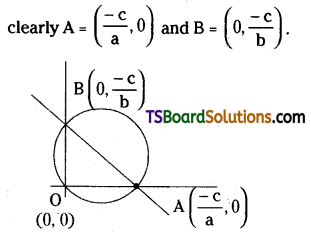
Let the equation of the required circle is
x2 + y2 + 2gx + 2fy + k = 0 ……..(1)
Since, (1) passes through the point O(0, 0), then
(0)2 + (0)2 + 2g(0) + 2f(0) + k = 0
⇒ k = 0
Since, (1) passes through the point A(\(\frac{-c}{a}\), 0), then
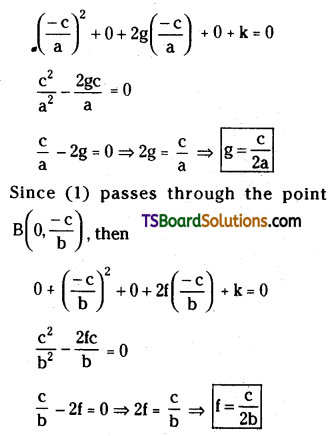
Now, substitute the values of g, f, k in (1)
∴ The equation of the required circle is
x2 + y2 + 2(\(\frac{c}{2a}\))x + 2(\(\frac{c}{2b}\))y + 0 = 0
⇒ abx2 + aby2 + bcx + acy = 0
⇒ ab(x2 + y2) + (bx + ay)c = 0
![]()
Question 22.
Find the equation of the circumcircle of the triangle formed by the straight lines x + 3y – 1 = 0, x + y + 1 = 0, 2x + 3y + 4 = 0.
Solution:
Given lines are x + 3y – 1 = 0, x + y + 1 = 0, 2x + 3y + 4 = 0
Consider a curve through vertices of the triangle formed by the given lines whose equation is
a(x + 3y – 1) (x + y + 1) + b(x + y + 1) (2x + 3y + 4) + c(2x + 3y + 4) (x + 3y – 1) = 0
⇒ a(x2 + xy + x + 3xy + 3y2 + 3y – x – y – 1) + b(2x2 + 3xy + 4x + 2xy + 3y2 + 4y + 2x + 3y + 4) + c(2x2 + 6xy – 2x + 3xy + 9y2 – 3y + 4x + 12y – 4) = 0
⇒ a(x2 + 3y2 + 4xy + 2y – 1) + b(2x2 + 5xy + 3y2 + 6x + 7y + 4) + c(2x2 + 9xy + 9y2 + 2x + 9y – 4) = 0 ……..(1)
Coefficient of x2 = a + 2b + 2c
Coefficient of y2 = 3a + 3b + 9c
Coefficient of xy = 4a + 5b + 9c
(1) represents a circle, then
(i) Coefficient of x2 = Coefficient of y2
⇒ a + 2b + 2c = 3a + 3b + 9c
⇒ 3a + 3b + 9c – a – 2b – 2c = 0
⇒ 2a + b + 7c = 0 …….(2)
(ii) Coefficient of xy = 0
⇒ 4a + 5b + 9c = 0 …….(3)
Solve (2) and (3)
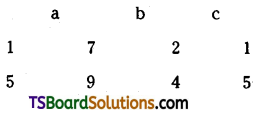
\(\frac{a}{9-35}=\frac{b}{28-18}=\frac{c}{10-4}\)
\(\frac{a}{-26}=\frac{b}{10}=\frac{c}{6}\)
∴ a = -26, b = 10, c = 6
Substitute the value of a, b, c in (1)
-26(x2 + 4xy + 3y2 + 2y – 1) + 10(2x2 + 5xy + 3y2 + 6x + 7y + 4) + 6(2x2 + 9xy + 9y2 + 2x + 9y – 4) = 0
⇒ -26x2 – 104xy – 78y2 – 52y + 26 + 20x2 + 50xy + 30y2 + 60x + 10y + 40 + 12x2 + 54xy + 54y2 + 12x + 54y – 24 = 0
⇒ 6x2 + 6y2 + 72x + 72y + 42 = 0
⇒ x2 + y2 + 12x + 12y + 7 = 0
∴ The equation of the required circle is x2 + y2 + 12x + 12y + 7 = 0
Question 23.
Find the equation of the circle passing through (-1, 0) and touching x + y – 7 = 0 at (3, 4).
Solution:
Let the equation of the required circle is
x2 + y2 + 2gx + 2fy + c = 0 ……..(1)
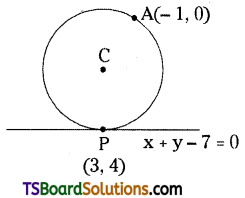
Since (1) passes through point A(-1, 0), then
(-1)2 + (0)2 + 2g(-1) + 2f(0) + c = 0
⇒ 1 – 2g + c = 0
⇒ c = 2g – 1 ……..(2)
Since, the line x + y – 7 = 0 touches the circle (1), then the given equation of a tangent is
x + y – 7 = 0 ………(3)
Now, the equation of tangent at P(3, 4) is S1 = 0
xx1 + yy1 + g(x + x1) + f(y + y1) + c = 0
⇒ x(3) + y(4) + g(x + 3) + f(y + 4) + 2g – 1 = 0
⇒ 3x + 4y + gx + 3g + fy + 4f + 2g – 1 = 0
⇒ 3x + 4y + gx + fy + 4f + 5g – 1 = 0
⇒ (3 + g)x + (4 + f)y + 5g + 4f – 1 = 0 ……….(4)
(3) and (4) represent the same line
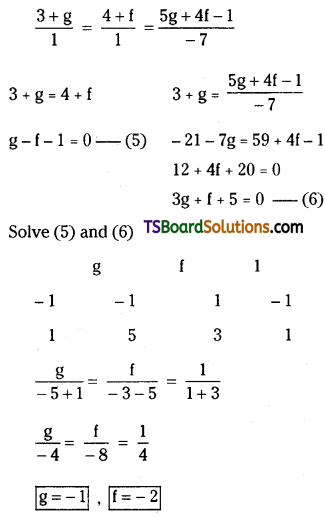
Substitute the value of g in (2)
c = 2(-1) – 1
⇒ c = -2 – 1
⇒ c = -3
Substitute the values of g, f, c in (1)
∴ The required equation of the circle is x2 + y2 + 2(-1)x + 2(-2) y – 3 = 0
⇒ x2 + y2 – 2x – 4y – 3 = 0
Question 24.
Find the equation of the circle which touches the circle x2 + y2 – 2x – 4y – 20 = 0 externally at (5, 5) with radius 5. [(AP) Mar. ’20; (TS) May ’16]
Solution:
Given equation of the circle is x2 + y2 – 2x – 4y – 20 = 0
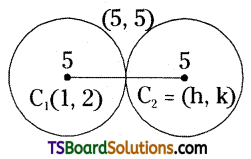
Comparing the given equation with x2 + y2 + 2gx + 2fy + c = 0,
we get g = -1, f = -2, c = -20
Centre C1 = (-g, -f) = (1, 2)
Radius r1 = \(\sqrt{1+4+20}=\sqrt{25}\) = 5
Let centre of the required circle is C2 = (h, k)
Radius r2 = 5
Given point of contact P = (5, 5)
Now, the point of contact ‘P’ divides \(\overline{\mathrm{C}_1 \mathrm{C}_2}\) in the ratio r1 : r2 (5 : 5 = 1 : 1) internally.
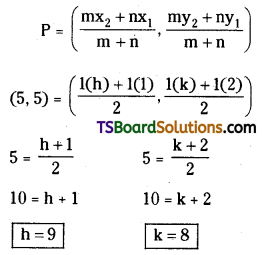
Hence, centre C2 = (9, 8)
∴ The equation of the required circle is (x – h)2 + (y – k)2 = r2
⇒ (x – 9)2 + (y – 8)2 = 52
⇒ x2 + 81 – 18x + y2 + 64 – 16y = 25
⇒ x2 + y2 – 18x – 16y + 120 = 0
Question 25.
If θ1, θ2 are the angles of inclination of tangents through a point P to the circle x2 + y2 = a2, then find the locus of P when cot θ1 + cot θ2 = k.
Solution:
Given the equation of the circle is x2 + y2 = a2
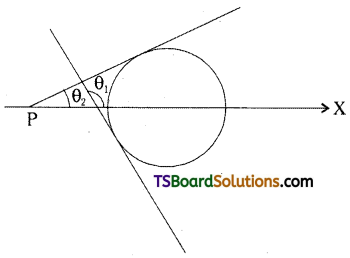
Let P(x1, y1) be a point on the locus.
The equation of the tangent to x2 + y2 = a2 having slope m is
y = mx ± \(a \sqrt{1+m^2}\) ……..(1)
If the tangent (1) passes through P, then
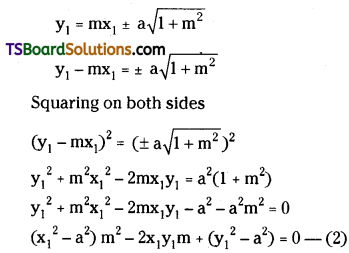
Let the roots of (2) be m1, m2
Since, the tangents make angles θ1, θ2 with x-axis then their slopes m1 = tan θ1 and m2 = tan θ2
∴ m1 + m2 = tan θ1 + tan θ2
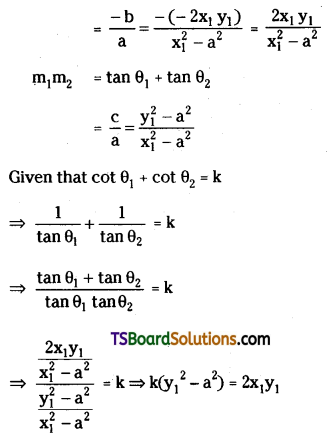
∴ The locus of P is k(y2 – a2) = 2xy.
![]()
Question 26.
Show that the poles of the tangents to the circle x2 + y2 = a2 w.r.t the circle (x + a)2 + y2 = 2a2 lie on y2 + 4ax = 0.
Solution:
Given the equation of the circle
(x + a)2 + y2 = 2a2
⇒ x2 + a2 + 2ax + y2 – 2a2 = 0
⇒ x2 + y2 + 2ax – a2 = 0 …….(1)
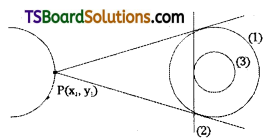
Comparing this equation with x2 + y2 + 2gx + 2fy + c = 0, we get
g = a, f = 0, c = -a2
Let P(x1, y1) be the pole
Now, the polar of P(x1, y1) w.r.t the circle (1) is S1 = 0
xx1 + yy1 + g(x + x1) + f(y + y1) + c = 0
⇒ xx1 + yy1 + a(x + x1) + 0(y + y1) – a2 = 0
⇒ xx1 + yy1 + ax + ax1 – a2 = 0
⇒ (x1 + a)x + y1y + (ax1 – a2) = 0 ………(2)
Given equation of the circle is x2 + y2 = a2 ……..(3)
Centre C = (0, 0), Radius r = a
Since (2) is a tangent to the circle (3), then r = d
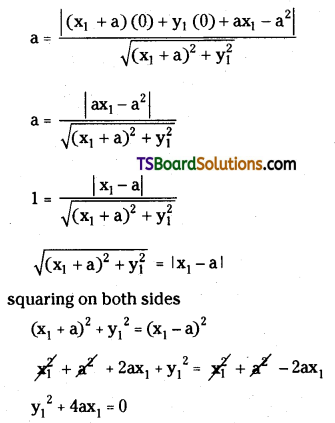
∴ The poles of the tangents to the circle (2) w.r.t the circle (1) lie on the curve y2 + 4ax = 0.
Question 27.
If the chord of contact of a point P w.r.t the circle x2 + y2 = a2 cut the circle at A and B such that ∠AOB = 90°, then show that P lies on the circle x2 + y2 = 2a2.
Solution:
Given the equation of the circle is
x2 + y2 = a2 ……(1)
Let P(x1, y1) be a point.
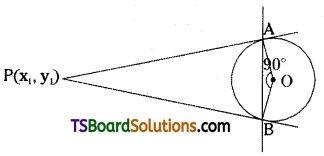
The equation of the chord of contact of P(x1, y1) w.r.t the circle x2 + y2 = a2 is S1 = 0
xx1 + yy1 = a2
\(\frac{xx_1+y y_1}{a^2}=1\) ……..(2)
Now homogenizing (1) with help of (2)
∴ The combined equation of \(\overrightarrow{\mathrm{OA}}\) and \(\overrightarrow{\mathrm{OB}}\) is x2 + y2 = a2 (1)2
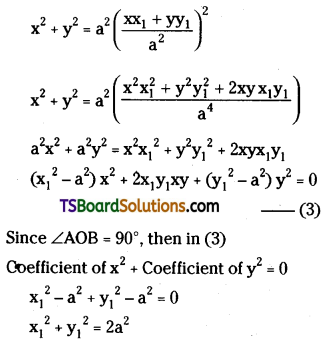
Hence, the point P(x1, y1) lies on the circle x2 + y2 = 2a2.
Question 28.
Show that the equation to the pair of tangents to the circle S = 0 from P(x1, y1) is \(S_1^2\) = SS11. [May ’14; Mar. ’03]
Solution:
Let the equation of the circle be S = x2 + y2 + 2gx + 2fy + c = 0

Let a line l = 0 through P(x1, y1) meet the circle in A and B.
Let Q(x, y) be any point on the line.
Let k : 1 be the ratio in which A divides \(\overline{\mathrm{PQ}}\)
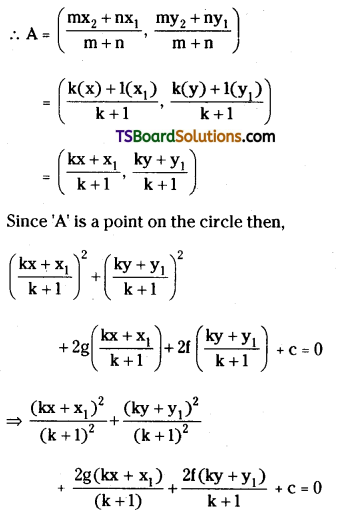
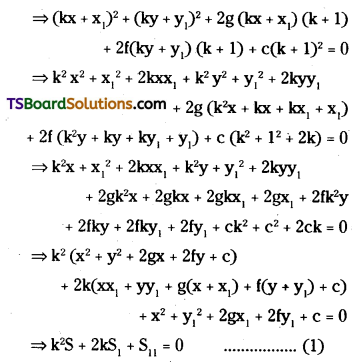
If L = 0 is a tangent to S = 0 then A & B coincide and the roots of (1) are equal.
∴ b2 – 4ac = 0
⇒ (2S1)2 – 4(S) (S11) = 0
⇒ 4\(S_1^2\) – 4SS11 = 0
⇒ \(S_1^2\) – SS11 = 0
⇒ \(S_1^2\) = SS11
∴ The locus of ‘Q’ is \(S_1^2\) = SS11
∴ The equation to the pair of tangents from P(x1, y1) is \(S_1^2\) = SS11.
Question 29.
Find the condition that the tangents drawn from the exterior point (g, f) to S = x2 + y2 + 2gx + 2fy + c = 0 are perpendicular to each other.
Solution:
Given the equation of the circle is
S = x2 + y2 + 2gx + 2fy + c = 0
Centre C = (-g, -f)
Radius r = \(\sqrt{g^2+f^2-c}\)
Let the given point P(x1, y1) = (g, f)
The angle between the tangents θ = 90°
Length of the tangents = \(\sqrt{S_{11}}\)
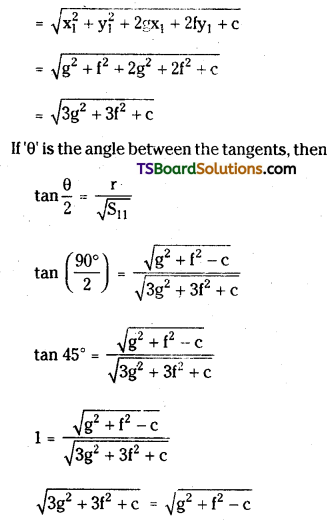
squaring on both sides
3g2 + 3f2 + c = g2 + f2 – c
⇒ 2g2 + 2f2 + 2c = 0
⇒ g2 + f2 + c = 0
![]()
Question 30.
Find the equation of the circle passing through P(1, 1), Q(2, -1) and R(3, 2).
Solution:
Let the equation of the required circle is
x2 + y2 + 2gx + 2fy + c = 0 ………(1)
Since, (1) passes through the point P(1, 1), then
(1)2 + (1)2 + 2g(1) + 2f(1) + c = 0
⇒ 1 + 1 + 2g + 2f + c = 0
⇒ 2g + 2f + c = -2 ……..(2)
Since, (1) passes through the point Q(2, -1), then
(2)2 + (-1)2 + 2g(2) + 2f(-1) + c = 0
⇒ 4 + 1 + 4g – 2f + c = 0
⇒ 4g – 2f + c = -5 …….(3)
Since, (1) passes through the point R(3, 2), then
(3)2 + (2)2 + 2g(3) + 2f(2) + c = 0
⇒ 9 + 4 + 6g + 4f + c = 0
⇒ 6g + 4f + c = -13 ………(4)
from (2) and (3)
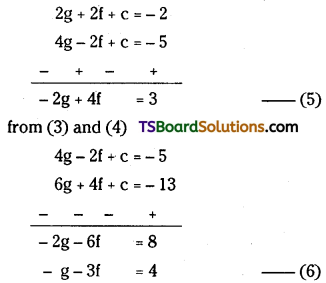
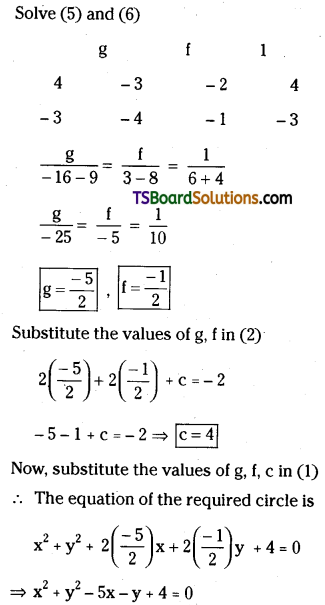
Question 31.
From a point on the circle x2 + y2 + 2gx + 2fy + c = 0, two tangents are drawn to the circle x2 + y2 + 2gx + 2fy + c sin2 α + (g2 + f2) cos2 α = 0. Prove that the angle between them is 2α.
Solution:
Given equations of the circles are
x2 + y2 + 2gx + 2fy + c = 0 ……..(1)
x2 + y2 + 2gx + 2fy + c sin2 α + (g2 + f2) cos2 α = 0 …….(2)
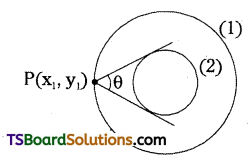
Let P(x1, y1) be a point on the circle (1), then
\(\mathrm{x}_1^2+\mathrm{y}_1^2+2 \mathrm{gx}_1+2 \mathrm{fy}_1+\mathrm{c}=0\) ……..(3)
The radius of the circle (2) is
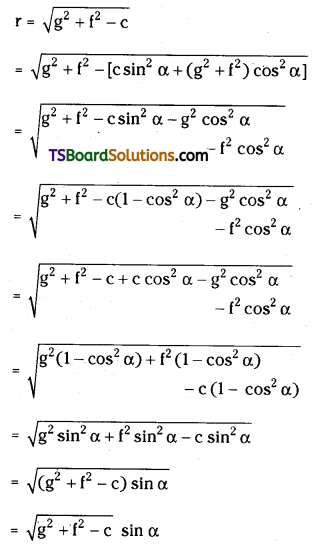
Length of the tangent of the circle (2)
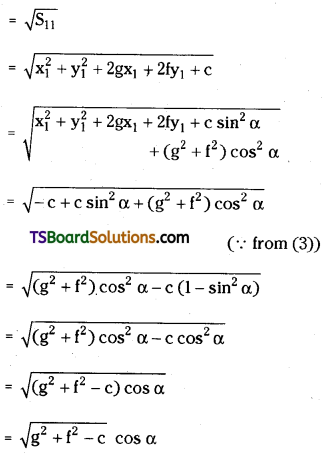
If θ is the angle between the tangents then
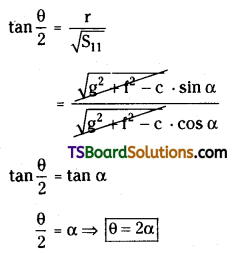
∴ The angle between the tangents θ = 2α.
Question 32.
Find the pair of tangents from the origin to the circle x2 + y2 + 2gx + 2fy + c = 0 and hence deduce a condition for these tangents to be perpendicular. (Mar. ’81)
Solution:
Given equation of the circle is x2 + y2 + 2gx + 2fy + c = 0
Here g = g, f = f, c = c
Let the given point P(x1, y1) = (0, 0)
The equation of the pair of tangents drawn from (0, 0) to the given circle is \(\mathrm{S}_1^2\) = SS11
⇒ [xx1 + yy1 + g(x + x1) + f(y + y1) + c]2 = (x2 + y2 + 2gx + 2fy + c) \(\left(\mathrm{x}_1{ }^2+\mathrm{y}_1{ }^2+2 \mathrm{g} \mathrm{x}_1+2 \mathrm{f} \mathrm{y}_1+\mathrm{c}\right)\)
⇒ [x(0) + y(0) + g(x + 0) + f(y + 0) + c]2 = (x2 + y2 + 2gx + 2fy + c) (0 + 0 + 0 + 0 + c)
⇒ (gx + fy + c)2 = (x2 + y2 + 2gx + 2fy + c) (c)
⇒ g2 x2 + f2 y2 + c2 + 2gf xy + 2fcy + 2gcx = cx2 + cy2 + 2gcx + 2fcy + c2
⇒ (g2 – c) x2 + 2gf xy + (f2 – c) y2 = 0
Given that these tangents are perpendicular then
coefficient of x2 + coefficient of y2 = 0
⇒ g2 – c + f2 – c = 0
⇒ g2 + f2 = 2c
![]()
Question 33.
Find the locus of the midpoint of the chords of contact of x2 + y2 = a2 from the points lying on the line lx + my + n = 0. [May ’03; Mar. ’90]
Solution:
Given the equation of the circle is
x2 + y2 = a2 …….(1)
Given the equation of the line is
lx + my + n = 0 ……..(2)
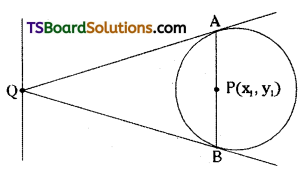
Let P(x1, y1) be a point on the locus then the point P(x1, y1) is the midpoint of the chord of the circle x2 + y2 = a2.
∴ The equation of the chord having P(x1, y1) as the midpoint of the circle (1) is S1 = S11.
⇒ xx1 + yy1 – a2 = \(\mathrm{x}_1{ }^2+\mathrm{y}_1^2\) – a2
⇒ xx1 + yy1 – (\(\mathrm{x}_1{ }^2+\mathrm{y}_1^2\)) = 0 ……….(3)
Now, the pole of (3) with respect to the circle is
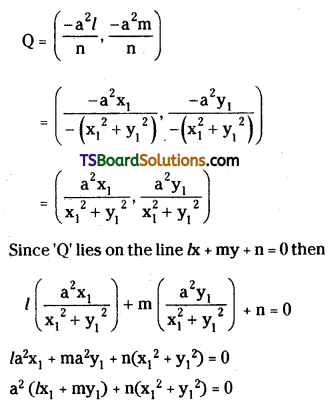
Hence the locus of P(x1, y1) is a2(lx + my) + n(x2 + y2) = 0.